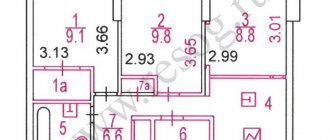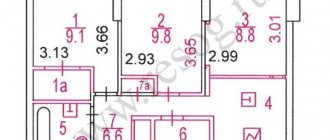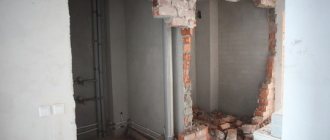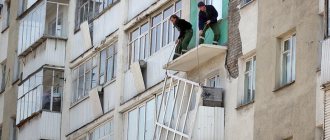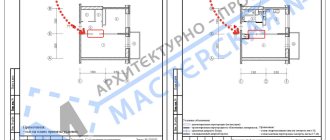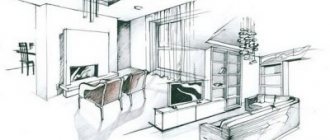assets/from_origin/upload/resize_cache/iblock/082/600_450_2/082a36e9f9d95901579deb03c50fb8e2.jpg From this article you will learn:
- What does illegal redevelopment mean?
- What actions are considered illegal redevelopment
- How to identify illegal redevelopment and what consequences are possible
- How to legalize the redevelopment of an apartment
It's no secret that the redevelopment of residential premises in Moscow should be legalized. There are often cases when people carry out redevelopment on their own and do not report their actions to the regulatory authorities - they do not notify the BTI and do not redo the technical passport for the apartment. We will tell you in our article what consequences illegal redevelopment may have for homeowners.
What is illegal redevelopment of an apartment and its signs
When planning work in residential and non-residential premises of an apartment building, you need to order a project and confirm the safety of changes to the object for the building. The conditions for the safe conduct of redevelopment work are checked during approvals from the Moscow Housing Inspectorate (Moszhilinspektsiya). This department will also check the compliance of the completed work with the project and legislative norms. The rules for design and approvals for these types of work are regulated by the Housing Code of the Russian Federation and regional regulations.
Responsibility for illegal redevelopment of non-residential premises occurs when the following violations are detected:
- if work was carried out without the consent of the owner of the premises (for example, if it was done by tenants or tenants);
- if the required documents were not drawn up for the work (in Moscow this is not only a project, but also a technical report on load-bearing structures);
- if the project documentation was not approved by the Moscow Housing Institute, or the inspection made a refusal decision;
- if during the work, deviations from the project were made, building codes, fire and other safety rules were violated.
These rules apply not only to apartments, but also to non-residential premises of apartment buildings. For example, if an individual entrepreneur illegally remodeled the basement of a residential building, converted it for hazardous production, or created a threat to the safety of the building, he will be fined and forced to return the premises to their original (original) state.
Expert commentary. A fine for illegal redevelopment of an apartment may be collected even if you bought the property with unapproved changes. Responsibility under the Code of Administrative Offenses of the Russian Federation lies with the current copyright holder of the apartment, and it is extremely difficult to make claims against the seller. To avoid such problems, carefully check the technical documents when purchasing an apartment, compare them with the actual state of the structures and equipment of the premises. We recommend paying special attention to the red lines on the floor plans of the BTI technical passport.
If the redevelopment is carried out in violation of building codes, it will be impossible to legitimize it even through the court. For example, this applies to the demolition of load-bearing walls inside an apartment.
Legislative regulation
The regulation of this issue refers to Article 26 of the Housing Code of the Russian Federation, which states: each owner of a residential premises must obtain the consent of the competent authorities before carrying out significant construction and repair work to change the configuration of housing.
Without prior approval and permission obtained, you cannot re-equip the premises by changing the location of utility networks or plumbing equipment.
Such work can begin strictly after confirmation of its admissibility by specialists; for this, the apartment owner provides all the necessary technical documentation.
All uncoordinated work is accompanied by a risk to the overall structure of the house, ranging from increased load on the structure to wall collapse.
Options for identifying illegally carried out repairs with redevelopment work:
- The most common source of information is neighbors; they can complain about constant noise from renovations, which violates their right to rest, as enshrined in law. A complaint can be written either directly to regulatory inspections or through the police, citing constant noise, a local police officer can be invited or a police squad can be called, who will then pass on the information to the authorized bodies for verification;
- The next person who can initiate a check of the legality of the work being carried out is the organization managing the house; it is in its interests to monitor the legality of the redevelopment, since part of the responsibility lies with the management company;
- The fact of illegal reconstruction of an apartment may be revealed during the sale of real estate; in a number of purchase and sale transactions, an employee from the BTI visits the property to carry out the necessary measurements and issue a new technical passport.
To avoid problems with the law and take measures to eliminate violations, all actions related to changing the technical characteristics of the apartment must be carried out legally.
Permitted and prohibited work
There are a number of works that can be carried out without prior approval, and they will not be considered a violation of building codes. But there are also works that require approval and those that are prohibited, the approval and legalization of which cannot be carried out.
This is important to know: How much does it cost to remodel an apartment?
You must obtain permission if your repair involves:
- work related to partitions such as
adding or removing doorways, - adding openings in load-bearing walls and/or floors,
- elimination of non-load-bearing partitions,
- construction of additional stairs,
- bathroom combination,
- installation or demolition of built-in furniture,
- glaze the loggia or balcony,
- change in location, installation of engineering, electrical networks, plumbing equipment,
- combining several rooms,
- transfer of gas and/or heating equipment,
- demolition of a balcony, extension or vestibule,
- installation of air conditioners and antennas,
- expanding the space of the room by adding a balcony to it.
There are a number of changes that are unacceptable and it is impossible to obtain permission for them:
- work affecting ventilation systems,
- increased load on load-bearing walls,
- carrying out actions to adapt residential premises to non-residential premises,
- combination with a kitchen equipped with gas equipment, without a door,
- transferring the heating battery to the balcony or loggia,
- construction of a loggia above the first floor,
- changing the location of the bath and kitchen,
- work that will result in the impossibility of accessing risers and disconnecting devices,
- violation of sanitary and fire rules and regulations,
- work that worsens the condition of the house and violates the rights of other owners.
Expert opinion
Kurtov Mikhail Sergeevich
Practitioner lawyer with 15 years of experience. Specializes in civil and family law. Author of dozens of articles on legal topics.
There are situations when, due to their characteristics, certain actions give rise to disputes about their legality. When inspecting the premises, the inspector makes a decision on the redevelopment carried out; if it does not fit within the framework of the law, the owner is obliged to eliminate everything.
If the apartment was purchased with a mortgage and is still pledged to the bank, then in some cases permission for repair work must be obtained not only from the housing inspection, but also from a credit institution, otherwise the apartment owner may face the following consequences:
- the bank representative has the right, in accordance with the clause stated in the loan agreement, to check the premises for the fact of changes,
- if an employee, based on the results of his inspection, reveals illegal redevelopment, then the agreements between you and the credit institution and the insurance company may be terminated, citing the terms you violated,
- the bank may receive an order to restore the technical characteristics of the apartment to its original appearance,
- The most unpleasant situation is the transfer of mortgaged housing in favor of the bank, since the apartment is pledged to it.
What are the dangers of illegal apartment redevelopment?
To find out what the consequences of remodeling an apartment without approval are, you need to refer to the norms of the Code of Administrative Offenses of the Russian Federation. However, a fine for remodeling an apartment without permission is not the only sanction for the copyright holder. If he cannot confirm that the completed work does not threaten the reliability and stability of the building, the Ministry of Housing and Construction will issue an order to restore the object to its original condition. All expenses for such will be borne by the offender. If you do not comply with the order, a corresponding lawsuit will be filed in court.
Fine for illegal redevelopment under the Code of Administrative Offenses of the Russian Federation
Let's look at the consequences of illegal redevelopment of an apartment according to the law. This offense is described in Article 7.21 of the Code of Administrative Offenses of the Russian Federation. Changes were made to this norm in April 2021. Now the wording of Art. 7.21 of the Code of Administrative Offenses is as follows:
- unauthorized reconstruction and redevelopment of residential premises entails a fine for citizens from 2000 to 2500 rubles;
- if the violation is committed by an official, he will be fined in the amount of 4,000 to 5,000 rubles;
- The fine for redevelopment without permission for an organization will be from 40,000 to 50,000 rubles.
- For violations committed by an individual entrepreneur, the same fine is collected as for a legal entity. faces.
A protocol is drawn up to submit materials for collection of a fine. It will describe the elements of the offense, information about the owner and the object. Please note that paying a fine does not relieve you of the obligation to legitimize the work performed or to restore the object to its original condition.
If the redevelopment was carried out without approvals, but did not entail violations in the construction sector, it can be legalized through the Ministry of Housing and Construction.
Regional fines
Regions can also introduce fines for violating the rules for carrying out work in residential and non-residential buildings. Since the fine for remodeling an apartment is approved at the federal level, regions can hold liable:
- for violation of work rules;
- for damage, damage or destruction of an object;
- for failure to comply with the instructions of the housing inspectorate and other supervisory authorities.
The Moscow Law on Administrative Offenses provides for a fine of 4,000 rubles. for damage to residential premises in an apartment building. In addition to a fine, the violator will be required to compensate or eliminate the damage caused. To compensate for damage or compel the alteration of the premises, a separate claim is filed in civil court.
| No. | Documents used when approving redevelopment | Description |
| 1 | Title document | Only the owner can carry out redevelopment. The title document can be an extract from the Unified State Register of Real Estate, a certificate of title |
| 2 | Owners' consent | The consent of all owners of the premises is required for redevelopment. Consent must be formalized in writing and submitted for approval. |
| 3 | Redevelopment project | The project contains a description of all redevelopment work and requirements for their safety. The project can be produced by an organization consisting of SRO designers. |
| 4 | Technical conclusion | The technical report describes the condition of the load-bearing structures for redevelopment. Based on the results of the inspections, the technical report draws a conclusion about the admissibility of the work, and draws up calculations for loads and structural reinforcements. |
| 5 | Acceptance committee report | The act is drawn up in the Moscow Housing Inspectorate after completion of the work. Specialists will check that redevelopment solutions comply with the project and technical conclusion. |
| 6 | Technical plan. | The main document on the basis of which the object is placed on cadastral registration with information entered into the Unified State Register of Real Estate. After redevelopment, the technical plan indicates the new characteristics of the room. The technical plan is prepared by a cadastral engineer after examining the building. |
An example is illegal redevelopment associated with expanding the area of an apartment beyond the overall dimensions of an apartment building. Such work is prohibited, so legalization will end in refusal.
Consequences of illegal redevelopment in non-residential buildings
In non-residential buildings, redevelopment work does not need to be coordinated. More precisely, this procedure does not involve contacting the Ministry of Housing, although the owner will still have to order a technical plan and register the changes in Rosreestr. But the customer approves the project for the work himself, after which he can begin redevelopment.
Taking into account the rules set out above, there is no penalty for illegal redevelopment of non-residential premises in a non-residential building. The owner can be cited only for violating safety during work, for damaging someone else’s property, or causing harm to people.
- Expert commentary. If the redevelopment is not legalized, consequences occur only when violations are revealed. Finding out what the repairs were in someone else's apartment is quite difficult. Therefore, many facts of illegal work are not revealed. However, discrepancies in the configuration of the premises will certainly be identified when transactions are completed. This will be grounds for refusal to register the agreement.
What is the danger of unauthorized illegal activity, where to complain?
The safety and ease of use of the housing stock depends on compliance with the approved construction and repair standards.
Inconsistent planning can lead, at best, to discomfort for people , and at worst, to the collapse of the building or its elements, loss of health and death of citizens.
If violations are detected, the culprit of the unauthorized reconstruction is obliged to return the condition of the premises to its previous form or legalize the changes, which threatens significant material costs. He is also subject to administrative liability, which includes fines.
If neighbors carry out illegal redevelopment in an apartment, creating a threat to the safety of the building or inconvenience in the use of common property, it is advisable to complain about them to the Housing Inspectorate. The appeal is made in the form of a statement, which is filled out randomly with a detailed statement of the fact of the violation.
It is permissible to file a complaint even if you are unsure whether the redevelopment was actually carried out and whether it is illegal. In this case, the authority’s employees are required to conduct an inspection. Based on the results, the applicant is provided with a written response.
If the complaint is not considered by the authorized agency, you should contact the prosecutor's office or court. If Housing Inspectorate employees are not allowed into an apartment, the authority has the right to initiate legal proceedings.
Who can be held accountable for illegal redevelopment of residential premises?
Responsibility for redevelopment carried out without permission or in violation of building codes arises on the basis of the protocol. It can be compiled by a specialist from the Moscow Housing Inspectorate. The algorithm for bringing to responsibility is as follows:
- a scheduled inspection is carried out in the apartment building, or an extraordinary inspection based on requests from citizens and organizations;
- upon the fact of a violation, a protocol is drawn up (it will indicate the place and time of consideration of the case);
- a decision on a fine for uncoordinated redevelopment of an apartment is made by an official of the Ministry of Housing or the court (this depends on the nature of the violations identified);
- if the owner does not agree with the resolution, he can file a complaint in court.
The owner has the right not to allow unauthorized persons into the apartment without a court order (except for police actions when preventing or suppressing crimes). If MZhI specialists have information about possible violations, they can force the court to allow them into the apartment. A court order can be executed by bailiffs with the imposition of an additional fine and enforcement fee. Thus, the consequences of unauthorized redevelopment may occur even if the owner refuses to open the door.
Expert commentary. At each stage of consideration of a case on illegal redevelopment, you can defend your interests with the support of a representative. To do this, you need to issue a power of attorney through a notary. Our company’s specialists will provide assistance in preparing documents, defending during the consideration of the case and appealing.
To coordinate the redevelopment, a project and a technical report on the condition of the load-bearing structures are ordered.
What it is?
In most cases, cosmetic or major repairs are not redevelopment and are not prohibited by Russian legislation.
If the work is carried out without changing the living space, affecting utility lines, or deforming persistent structures, they are permissible and do not require the approval of authorized structures. Otherwise, official permission is required for major construction and repair activities; changes should be legalized in the approved manner.
Attention ! Article 29 of the Housing Code of the Russian Federation recognizes illegal (unauthorized) redevelopment carried out without coordination with government agencies, in violation of the redevelopment project.
Authorized departments have approved types of work that may pose a threat to the safety of buildings, communications and citizens themselves. What is illegal redevelopment, read on. The following construction and repair activities are classified as illegal redevelopment :
- Work that worsens the operating conditions of the building and people's habitation.
- Changes that make the premises uninhabitable.
- Deformation of the building's load-bearing structures.
- Installation of shut-off or regulation devices on general apartment communications, which affects the consumption of resources by other residents.
- Elimination and reduction of the cross-section of ventilation ducts.
- Reorganization of the residential stock into non-residential.
- Combining loggias, balconies with rooms.
- Creating excessive load on building structures when installing floors, partitions, and placing equipment.
- Installation of radiators on balconies, verandas, loggias.
- Violation of SanPiN and fire safety standards during work.
- Unauthorized installation of loggias, balconies and terraces.
- Combining the kitchen with the living room (when using gas).
- Construction of more than one mezzanine and so on.
Such work must be approved by housing authorities; changes must be legalized in order to avoid creating dangerous living conditions and bringing the perpetrator to justice.
How to legalize unauthorized redevelopment in Moscow
Even if the owner was unable to avoid liability for the illegal redevelopment of the apartment, it still needs to be approved. To do this, you need to draw up and collect documents confirming the safety of the work and its compliance with construction regulations. The process of legitimation itself can take place administratively (through MZhI), or through the court. Read more about this procedure below.
Documents to legitimize uncoordinated redevelopment
Unauthorized redevelopment of residential premises can be legalized after the work is completed. To confirm that the configuration change was carried out in compliance with safety standards and does not threaten the reliability and stability of the MKD structures. The list of documents that may be required when applying to the Ministry of Housing or the court includes:
- application for approval (submitted directly to the Moscow Housing Institute or via the mos.ru website);
- statement of claim (needed when going to court if MZhI refused to legitimize);
- technical report on the condition of load-bearing structures (issued through the author of the MKD project, or through the State Budgetary Institution “Expert Center”;
- technical plan describing the new configuration and updated characteristics of the premises;
- consent of the owners of the premises;
- minutes of the general meeting of the apartment building, if the work was carried out on common property.
The exact list of documents can only be determined for a specific situation. Our company’s specialists will provide assistance with their preparation.
In this example, a floor plan was made for the premises after redevelopment.
Contacting MJI
In most cases, the consequences of illegal redevelopment of an apartment can be eliminated administratively. This procedure goes through the MJI and is characterized by the following nuances:
- the owner needs to confirm that the completed work complies with regulations and does not pose a safety hazard;
- To confirm the safety of the redevelopment, you need to obtain technical support. conclusion on the condition of the load-bearing structures of the MKD (experts will examine them and indicate conclusions about the absence of threats to reliability and strength);
- If the Moscow Housing Institute gives permission for legalization, based on the technical plan, you need to register with Rosreestr and enter new data into the Unified State Register of Real Estate.
In the process of legalization, you can generally avoid liability for unauthorized redevelopment. If the owner himself submitted documents to the Ministry of Housing, a protocol may not be drawn up. The procedure is carried out free of charge, and inspection specialists are required to make a final decision no later than 45 days.
Judicial order
In cases where the submitted documents provide ambiguous evidence of the safe performance of work, the Ministry of Housing and Inspection may refuse to legitimize. This often happens due to excessive reinsurance by officials who are afraid to make a positive decision themselves. In this case, the owner will have to go to court. Here are the main points related to the legalization of redevelopment through the courts:
- when filing a claim in court, you must confirm that the applicant went through the administrative approval procedure, but was refused;
- The main documents for proof in court will be those. conclusion on the safe condition of structures and a technical plan with new characteristics of the premises;
- for proof, you can draw up a conclusion from a cadastral engineer (it will be done by specialists from our company);
- If the court makes a positive decision, on its basis Rosreestr will enter new data into the Unified State Register of Real Estate.
You can also challenge the fine for redevelopment of non-residential premises or apartments without permission through the court. When appealing, you must prove violations committed during prosecution, or full compliance with work safety.
Expert commentary. An independent appeal to the Ministry of Housing or the court may lead to problems in legitimizing redevelopment work. Only the support of a specialist who knows the nuances of federal and regional legislation will help to avoid them. Our specialists know what issues are paid attention to during approvals and will take these points into account in advance when preparing documents.
If unauthorized reconstruction of housing cannot be agreed upon
If such violations are identified that it is no longer possible to legitimize an unauthorized change in the layout, the inspector will issue an order to return the premises to its original form. Sometimes it is almost impossible to fulfill such an order. So, if during the repair a load-bearing wall was affected, in which, for example, an opening was made, then returning it to the “as it was” position may not only be impossible, but also unsafe.
In such complex cases, a separate project is developed, which is carried out by firms with experienced housing staff. Note that the development of such a project is an expensive procedure, as is the restoration work itself, and it is clear that all these costs will be borne by the owner, who ignored the approval procedure.
When the owner refuses to legalize the redevelopment, the Housing Inspectorate has the right to sue him. According to Russian laws, a tenant can be evicted from an apartment only on the basis of a court decision. If the Housing Inspectorate goes to court with a claim, the owner of the property faces the forced sale of the residential premises at an auction price, termination of ownership and collection of the cost of restoration work. In practice, such cases are rare, but it is still worth knowing about the possibility of such consequences.
List of useful documents
Documents for download:
| No. | Links | Description |
| 1 | Sample technical report | |
| 2 | Sample USRN extract | |
| 3 | Sample technical plan | |
| 4 | Sample redevelopment project | |
| 5 | Sample application for approval of redevelopment | |
| 6 | Application for cadastral registration | |
| 7 | Instructions for the applicant when submitting documents to the MFC | |
| 8 | Sample terms of reference for redevelopment |
New
The legislation on redevelopment has not received any major changes this year. Innovations in the coordination of reconstruction were:
- The applicant has the right not to submit a technical passport and an expert opinion from the service involved in the protection of cultural and architectural monuments;
- If the right to an apartment undergoing alteration is registered in the Unified State Register, then there is no need to submit documents confirming such powers.
It should be noted that in addition to the judicial resolution of the issue of illegal redevelopment, it is possible to legalize unauthorized repairs through an administrative procedure established by the local municipality. It consists of obtaining permits for reconstruction work. But this is only possible if the necessary approvals from the relevant services and expert opinions have been obtained.
Time frames and costs for legalizing unauthorized redevelopment of residential premises in apartment buildings
Illegal redevelopment of premises is not a death sentence! With proper preparation of documents and justification of the requirements, you can go through all the procedures, obtain permits and an extract from the Unified State Register of Real Estate with the new characteristics of the premises. The deadlines for legalization are determined as follows:
- technical preparation conclusions and technical plans are allowed only after inspection of objects, so it may take several days;
- 45 days are given for consideration of documents by the Moscow Housing Institute;
- the judicial procedure may take up to two months;
- registration in Rosreestr is carried out in 7 or days (depending on the method of submitting documents).
There is no need to pay for legalization in MZhI. When filing a claim in court, the state fee will be 300 rubles. (for citizens) or 6000 rub. (for organizations). Additional costs will be associated with payment for technical registration services. conclusion and technical plan. Approximate prices for services and documents can be found in the table below.
The graphic part of the technical plan for the premises records its configuration and main characteristics.
How to avoid or reduce punishment
In order not to fall under prohibitive and punitive actions from the state, you need to obtain permission for redevelopment in advance. Carrying out a permitting procedure following a major overhaul is a lottery that violators more often lose. It will be possible to reduce legal and other costs if the results of repair work are legalized in a timely manner.
For legalization it is necessary:
- Collect a package of necessary documents;
- To write an application;
- Pay the prescribed state fee;
- Submit papers to the housing commission;
- If the procedure has been completed and you have been able to obtain permission, contact the BTI to obtain a current registration certificate.
Our services
Our company employs specialists with experience in legitimizing even the most complex redevelopments. We will help:
- appeal a fine for illegal planning;
- quickly prepare documents for applying to the Ministry of Housing and the Court;
- register with Rosreestr and receive an extract from the Unified State Register of Real Estate;
- make changes to the technical passport of the BTI, as this is required by the Housing Code of the Russian Federation.
To agree on the timing and cost of services or document execution, contact our consultants and describe the situation in detail.
| No. | Service, document | Price |
| 1 | Redevelopment design | from 12,000 rub. (depends on the area and features of the object, type of work |
| 2 | Support for redevelopment approvals | from 10,000 rub. |
| 3 | Preparation of a technical plan | from 8000 rub. |
| 4 | Support of the cadastral registration procedure in Rosreestr or MFC | from 12,000 rub. |
| 5 | Drawing up a technical report | from 15,000 rub. |
What is the essence of the changes?
From 05/05/2020, officials (for example, general directors of companies) will be fined up to 3 thousand rubles for using residential premises other than for their intended purpose (i.e. not for people to live in, but, for example, for the sale of goods or provision of services). ., and legal entities up to 30 thousand rubles.
In addition, for unauthorized reconstruction or redevelopment of premises in an apartment building, a fine of up to five thousand rubles may be imposed on officials, and a fine of up to fifty thousand rubles on legal entities.
Many conscientious entrepreneurs, of course, have questions. For example, what is considered unauthorized redevelopment or reconstruction of premises
?
Reorganization
by virtue of Part 1 of Art. 25 of the Housing Code of the Russian Federation refers to the installation, replacement or transfer of utility networks, sanitary, electrical or other equipment that requires changes to the technical passport of the premises.
By virtue of Part 2 of Art. 25 Residential Complex of the Russian Federation, redevelopment
premises in an apartment building represents a change in its configuration, requiring changes to the technical passport of the premises. Based on clause 1.7.1 of the Resolution of the State Construction Committee of the Russian Federation dated September 27, 2003 N 170, redevelopment of premises may include: moving and dismantling partitions, moving and installing doorways, disaggregating or enlarging multi-room apartments, installing additional kitchens and bathrooms, expanding living space due to auxiliary premises, elimination of dark kitchens and entrances to kitchens through apartments or living quarters, installation or re-equipment of existing vestibules.
Thus, in most cases, redevelopment is associated with changing the configuration of the walls of the room, and reconstruction concerns the replacement and transfer of utility networks.
conclusions
- Illegal redevelopment may involve performing work without a design or permit, in violation of building rules and safety standards.
- Sanctions for illegal redevelopment of an apartment are specified in the Code of Administrative Offenses of the Russian Federation and provide for the imposition of a fine.
- The work performed can be legitimized through the Moscow Housing Inspectorate or the court, confirming the safety of the building and its structures.
With the support of our specialists, you will go through the legalization procedure as quickly and without complications as possible. Call us, we will tell you in detail about all the nuances of cooperation.
Fine amount in 2021
If we summarize the standards regulating this area of activity of the population, then all penalties for the illegal nature of this activity can be reduced to the following indicators for individuals:
- apartment owners and responsible tenants in apartment buildings must pay 2000 - 2500 rubles;
- owners of detached buildings (residential and non-residential buildings, etc.) pay less - 1000 - 1500 rubles;
- under the article “arbitrariness” you need to pay no more than 300 rubles.
The liability of legal entities is always higher than that of individuals. For organizations, the fine is measured in the following quantities.
- in accordance with the provisions of Art. 7.22 of the Code of Administrative Offenses of the Russian Federation you will have to pay from 40 to 50 thousand rubles;
- in special cases for apartment owners, the fine can reach 100,000 rubles;
- owners of large non-residential premises, under some circumstances, can pay from 300,000 to 350,000 rubles.
There is also such a thing as officials. For them, the law determines a special fine amount:
- 300-500 rubles under the article “arbitrariness”;
- 3000 – 5000 according to article 14.9.1. Code of Administrative Offences.
First violation and fine
Depending on the situation, newly discovered violations may cost the owner or user of real estate a minimum amount within the range of the prescribed fines. If a person has created a minor danger to others through illegal redevelopment, then the first time he can get off with only a warning.
You can also count on a warning if an individual or legal entity has submitted an application to recognize the redevelopment as legal.
If done in a mortgaged apartment
The terms of loan agreements of financial institutions prohibit redevelopment of a mortgaged apartment. When planning to renovate your home, you should consider:
- A bank employee has the right to visit an apartment purchased with a mortgage and check its technical condition - this condition is stated in the loan agreement. The tenant has no right to prevent inspection.
- Carrying out uncoordinated repairs entails the refusal of the insurance company to draw up an apartment insurance agreement with the borrower. Such a document must be submitted to the bank annually. Lack of insurance becomes a reason for terminating the loan agreement with the borrower.
- If a financial institution receives information about the illegal conversion of mortgaged housing, various legal consequences for the owner are possible - forced approval, termination of the loan agreement, payment of a penalty, and so on.
Attention ! The bank will report the illegal redevelopment to the Housing Inspectorate. That is, administrative liability will be imposed on the borrower.
How is a sketch different from a project?
In Moscow, permission for redevelopment is obtained not only according to the Project, but also according to the sketch.
The use of one of the bathrooms for a storage room with a washing machine, the rearrangement of plumbing equipment within the dimensions of the bathroom - the simplest changes in the plan of an apartment in Moscow can be coordinated according to a sketch. The owner first carries out such work in kind, and then deals with the paperwork.
However, most changes to the apartment plan are allowed to be carried out only after approval of the Project, otherwise there will be fines and court proceedings. Thus, you need to clearly know that the events you are planning are allowed to be coordinated according to the sketch in order to avoid the consequences of unauthorized redevelopment.
The actions listed in paragraphs 2 and 3 of Appendix 1 to Moscow Government Decree No. 508-PP require the preparation of a Project, and activities not specified in these paragraphs may be coordinated according to the Sketch.
However, not all regions have a similar procedure. The general rule involves first obtaining permission for redevelopment, and then carrying out construction work.
Carrying out redevelopment and reconstruction without coordination with the authorized bodies is a serious violation of the Housing Code of the Russian Federation. For such actions, you can not only receive a fine, but also lose your own apartment - Article 29 of the Housing Code of the Russian Federation provides for serious punishment.
General information about redevelopment
Illegal redevelopment of a residential premises is the carrying out of repair work in which the structure and space of the building are changed, and permission for this has not been obtained. This refers to capital changes. Minor amendments, for example, cosmetic repairs, do not need to be approved by government agencies.
As a rule, you must first obtain permission before starting repair work. But the legislation also provides for the possibility of legalizing redevelopment in the future. But this is not always beneficial to people. After all, if the government agency does not agree to legalize the changes, the residential premises will have to be returned to their original appearance. This will result in large financial expenses.
What applies to redevelopment:
- Construction of partitions.
- Relocation, dismantling of walls and partitions.
- Relocating the location of the bathroom and toilet rooms.
- Increase in residential area at the expense of non-residential.
- Combining a bathroom and a bathroom, a kitchen and a room.
- Liquidation of the storage room.
- Enlargement of the corridor at the expense of the room.
- Replacing a gas stove with an electric one.
- Construction of openings in load-bearing walls, laying the opening.
- Changing the shape of window and door openings in external enclosing structures.
- Changing the design of floors in wooden floors.
- Construction of a mezzanine (should not occupy more than 40 percent of the area), etc.
Thus, redevelopment is any change in the area and configuration of a room that requires reflection in the BTI plan.
Redevelopment includes not only changing the location of walls and partitions, but also installing and moving plumbing equipment and a kitchen stove.
Before carrying out the above work in situ, you need to prepare a redevelopment project (hereinafter referred to as the Project), and then have it approved by the authorized authorities (Article 26 of the Housing Code of the Russian Federation).
It should be noted that each region may have its own characteristics when coordinating redevelopment, and there may also be differences in the specific lists of prohibited and permitted activities.
For example, in Moscow, the requirements for reconstruction and redevelopment are established by Moscow Government Decree No. 508-PP dated October 25, 2011.
Let's sum it up
To legalize redevelopment for which the necessary approvals have not been obtained from government agencies, you need to go to court. Another option is to return the apartment to its previous condition.
If the owner of the apartment received an order to return the apartment to its original condition, and he did not take the appropriate actions within a certain period, the apartment must be sold at auction.
We also must not forget that unauthorized redevelopment can worsen the condition of an apartment building, therefore, for the safety of the building, it is recommended to carry out preliminary approval of the Project.
Video about the dangers of unauthorized redevelopment
